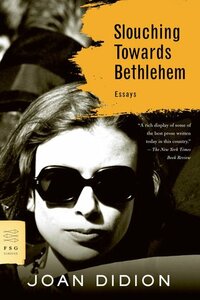You need to sign in or sign up before continuing.
Take a photo of a barcode or cover
hopeful
reflective
sad
medium-paced
reflective
slow-paced
inspiring
reflective
slow-paced
reflective
relaxing
slow-paced
emotional
funny
informative
mysterious
reflective
relaxing
sad
slow-paced
I really enjoyed the first third of this book. Didion is able to write these accounts in a way where she blends into the background and I tend to forget someone is writing at all, and I think that is a particularly unique style to the essays I liked most.
I thought this part of the book was not only the best written, but also the most diverse. ‘John Wayne: A Love Song’ was surprising moving, and one that really stuck out. Both ‘Comrade Laski’ and ‘Marrying Absurd’ were short but funny and bleak and endearing, particularly the latter.
I think it was in the rest of the collection that I found the writing and content less appealing. In part, I think it is stronger and more engaging to hear about the stories of others by an excellent writer than to be handed essay after essay about themselves. There was a mix of strange patriotism and complete incessant bleakness towards life and the US and purpose in this section, which worked for the first one or two but afterwards became a familiar formula, which I think didn’t work when read back-to-back. They were by no means bad but paled in comparison to the first part of the book.
Of her more personal essays, I found ‘Los Angeles Notebook’, ‘On Self-Respect’, and ‘Goodbye to All That’ most engaging.
I thought this part of the book was not only the best written, but also the most diverse. ‘John Wayne: A Love Song’ was surprising moving, and one that really stuck out. Both ‘Comrade Laski’ and ‘Marrying Absurd’ were short but funny and bleak and endearing, particularly the latter.
I think it was in the rest of the collection that I found the writing and content less appealing. In part, I think it is stronger and more engaging to hear about the stories of others by an excellent writer than to be handed essay after essay about themselves. There was a mix of strange patriotism and complete incessant bleakness towards life and the US and purpose in this section, which worked for the first one or two but afterwards became a familiar formula, which I think didn’t work when read back-to-back. They were by no means bad but paled in comparison to the first part of the book.
Of her more personal essays, I found ‘Los Angeles Notebook’, ‘On Self-Respect’, and ‘Goodbye to All That’ most engaging.
funny
informative
reflective
slow-paced
funny
informative
reflective
fast-paced
I might be an incredibly easy to please reader, but I absolutely loved this book. I think Joan Didion somehow knew what a brown girl born in Los Angeles in 2003 would like to read about the U.S. in the 60's and she catalogued it all and collected it within the pages of this book. I love stories about Alcatraz (I wrote a research paper on it in 8th grade like I was so real), I love Joan Baez, and I loved reading about how the Haight-Ashbury used to be. My absolute two favorite essays were "On Keeping a Notebook" and "Goodbye to All That." They both were written exactly like how I would have (if I was a better writer, and was a cooler person, and was writing in the 60's). The only essay I had to pause at was "Paradise," the one written about the evolution of Hawaii before and after WWII. I understand Joan Didion was a white woman (she couldn't control that), but it sometimes read as romanticizing—or rather, beginning with—Hawaii as a colonized land. She mentions Hawaii before the U.S. overthrew Queen Liliuokalani and annexed the land and enabled the Big 5 companies to lead an unbroken several decade long economic dictatorship over the land (broken only by WWII) only briefly—like 2 or 3 words sort of brief. I would have loved for Didion's razor-sharp pen to cut through the colonialism and economic feudalism that tried to break the Hawaiian spirit, but alas this is a book written by a white woman in the 60's. I still really do love Joan Didion, I just know the sort of observances she has will not always coalesce with mine—and that's ok! That's what reading is all about.
It's beautifully written and i enjoyed it very much. However, it is a very white gaze on every place and cultural event she's talking about and the amount of times, that she just barely actually talks about black or indigenous people is flabbergasting. (And it makes me kind of angry, that the reception of this book is so extremely positive, because, well, it's white and privileged, but oh so beautifully written.)
inspiring
reflective
medium-paced






